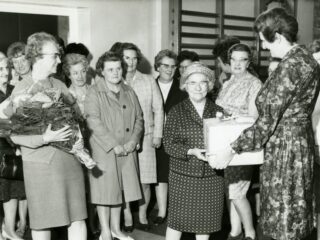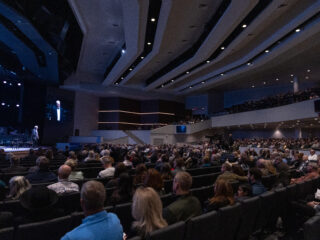Bill Wilson was the founding pastor of Brentwood Baptist Church. Brentwood Baptist Church is the church I have served for thirty years. Over the course of his ministry, Bill led a church plant from the basement of the administration building at the Tennessee Baptist Children’s Home to become one of the largest churches in our state. He put the missions and community service DNA in our church. He served for over 20 years and retired loved and respected by the church and community.
Since it’s founding in 1969, Brentwood Baptist Church has had two pastors – Bill Wilson and me. We used to laugh with each other that we were in a very exclusive fraternity with only two members.
Bill and I became very close friends. Besides my father, I would be hard-pressed to find a man who had more influence and impact on my life than he did.
Bill and I talked about everything. We talked about sports. We talked about family. We talked about being a pastor. In particular, we talked about being the pastor of Brentwood Baptist Church. We talked about preaching and what it meant to be a great preacher.
Here’s what we concluded. Now, remember, this isn’t a scientific study, but the ending point of hours of detailed analysis of preachers and preaching and great sermons we had heard. First, what determines a great sermon? A great sermon is one you can remember years later. A brilliant sermon is one you can quote years later. That was our definition anyway.
Needless to say, neither Bill nor I preached many great sermons. Certainly, neither of us preached any brilliant sermons.
Most pastors aren’t great preachers. We’re okay. We can hold our congregation’s attention for twenty or thirty minutes, but our words rarely inspire any kind of movements or revivals. We show up, Sunday after Sunday, and do our best. Over time, the most fortunate of us actually do some good.
Here is something Bill and I discovered in our conversations about preaching and preachers. We knew several preachers who, when you studied their sermons, weren’t great preachers. There were no life-changing phrases or mind-blowing scriptural insights. Their sermons were solid in their biblical teaching, but their words were heartbreaking in their compassion and love for their congregations. If you didn’t get anything else from their sermons, you got this: these pastors loved their congregations.
Bill was like this. Anyone who knew Bill would describe him as being exceptionally kind. (Few people would describe me that way.) Whenever Bill preached, whenever he talked to anyone in any capacity, the people listening to him knew one thing: Bill loved them. They knew whatever Bill told them, even when it was hard to hear, Bill was telling them because he loved them. I saw him handle difficult negotiations and tough issues within the families of our congregation and to this day, the people involved love Bill Wilson.
Because they knew Bill loved them.
I thought about Bill the other day when I was listening to another talking head discuss how divided our nation is. We’re to the point, the commentator said, where neither side will listen to the other side. Words are shouted, insults are thrown back and forth and in all of this heat, little light is found and nothing is solved.
I wonder how Bill would have handled this mess.
I think I know.
He would have sat down with the other person. He would have gone to wherever they were and he would have sat down with them over coffee, or lunch, or dinner. He wouldn’t be in a hurry. He wouldn’t check his phone. He would have been totally present in the moment.
Bill would have started with casual questions. Where did you grow up? Where did you go to school? Married? Children? Bill would ask about their work. Then, they would slowly approach the issue. Bill would look at the person. He would stare or glare and he would never look away. He would just hold the person in his gaze and listen.
And listen.
And listen.
And listen.
He would quietly drain all of the anger out of their words. He would disarm them with the safety of his attention. He may engage with a few questions, but mostly he would listen. He might continue the conversation or he might say he wanted to think about some of the things he had heard and continue their conversation later.
Bill would never respond in anger. He would never give anyone the feeling that he felt threatened and he never needed to threaten anyone. Bill would make sure the person he was talking with knew how much he loved them. Whenever Bill chose to say what he needed to say, his words would be heard and considered because the person would know how much Bill loved them.
I wonder if our “enemies” – whoever they are – know how much we, the church, love them. I wonder if we could disarm their anger if we showed up with a cup of coffee instead of a protest sign. What if the main message we tried to get across to those who disagreed with us or attacked us was how much we love them? What if they knew, even when we said hard things to them, we said those hard things because of our love for them?
As Christ-followers, we’re commanded to speak the truth in love. Being right, telling the truth isn’t enough. People listening to us must be convinced we love them. They must know everything we’re doing is for their best.
I’m not sure they do.
I know what you’re thinking. It’s the same thing I’m thinking. How can you have a polite conversation with someone who won’t stop yelling? I have a feeling Jesus would answer our objection the same way my mother did when I raised similar issues with her. She would tell me, “I’m not raising ‘them’. I’m raising you. If I was raising ‘them’, ‘they’ would be different.”
I think Jesus would say to us, “They don’t claim to belong to Me. You do.” The burden is on us, followers of the cross, to find a way to begin the conversation. We must bear whatever is required to reach them in their humanity. This is what love does.
Then, we’ll listen. And listen some more.
Only then will we speak and, when we do, we’ll speak the truth in love. After all, if you aren’t speaking the truth in love, you aren’t speaking for Jesus at all.









